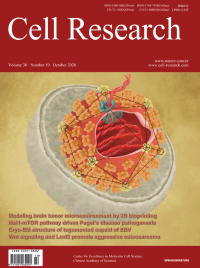
Advanced Search
Submit Manuscript
Advanced Search
Submit Manuscript
Volume 30, No 10, Oct 2020
ISSN: 1001-0602
EISSN: 1748-7838 2018
impact factor 17.848*
(Clarivate Analytics, 2019)
Volume 30 Issue 10, October 2020: 827-828
A special collection of reviews on frontiers in immunology
Chenqi Xu1,2,* , Hua-Bing Li3,4,* , Richard A. Flavell5,6,*
1State Key Laboratory of Molecular Biology, CAS Center for Excellence in Molecular Cell Science, Shanghai Institute of Biochemistry and Cell Biology, Chinese Academy of Sciences, Shanghai 200031, ChinaDuring this challenging period in human history when SARS-CoV-2 has infected more than 20 million people without any sign of an end in sight, we have never been so in need of a healthy immune system to shield ourselves against this highly infectious virus. The reality is that we are still lacking in immunological knowledge to quickly develop therapeutics, either a drug or a vaccine, to slow down the spread of the virus. However, past immunological research has successfully rewarded human society with various immunotherapies, such as the immune checkpoint blockade therapies that have treated numerous cancer patients. The immune system, which intersects with virtually every system in the human body, lies at the center of health and disease. The complexity of the human immune system reflects an ancient Chinese philosophy known as “Yin and Yang”. Immune function needs to be robust yet restrained to efficiently clean up external threats without causing self-damage. When there are “positive” types of immune cells, “negative” types of immune cells must exist simultaneously. At a molecular level, stimulatory and inhibitory molecules reciprocally interplay to elicit well-regulated immune responses. To understand the dynamic and complicated immune responses, immunologists have stepped out of their comfort zones to absorb knowledge from other fields and to apply the newest technologies in their research. Many new branches of immunology have emerged in recent years, including but not limited to, cancer immunology, immunometabolism, microbiota and immunity, neuroimmunology.
https://doi.org/10.1038/s41422-020-00403-7